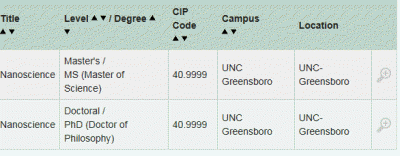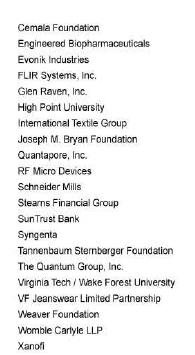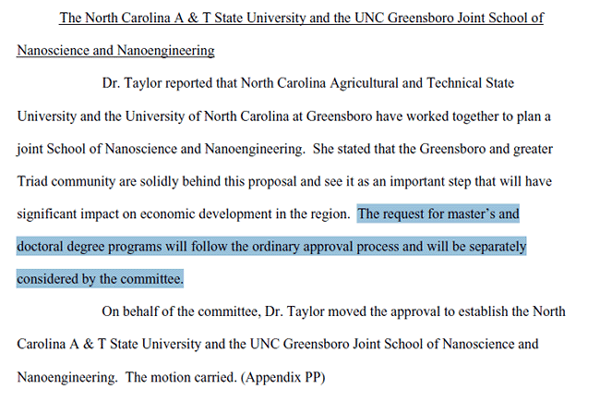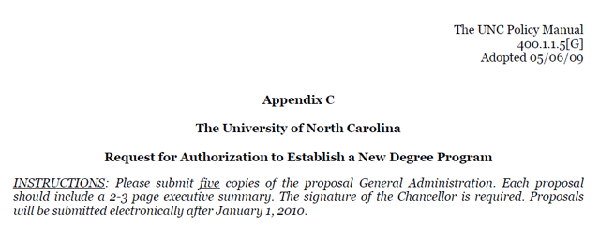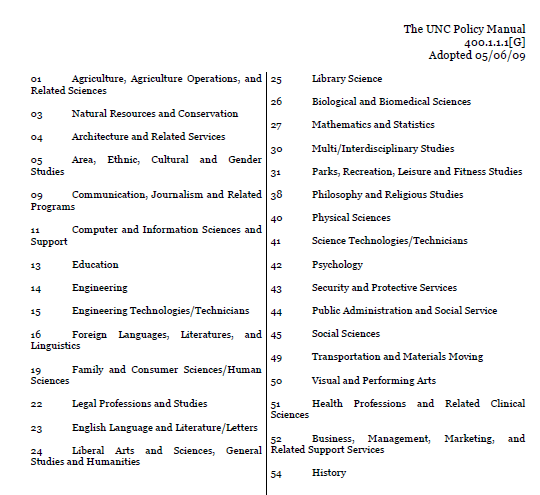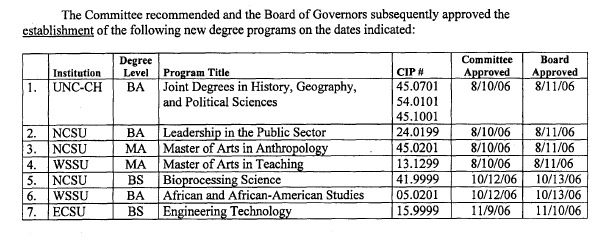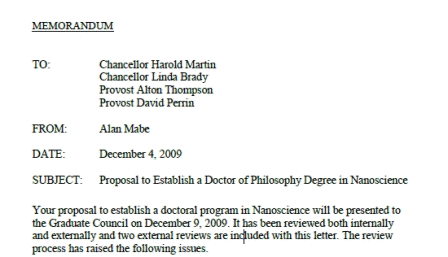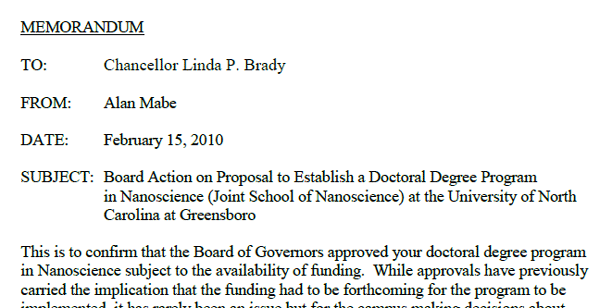|
Black Triad News. Com
"News and Views of People of Color in the Triad and Beyond" |
|
|
|
|
|
UNC Board of Governors Minutes May
2006 |
|
|
|
|
| The North Carolina
A&T State University and the UNC Greensboro Joint School of
Nanoscience and Nanoengineering.
Dr. Priscilla P. Taylor (Cemala Foundation) reported
that the Greensboro and greater Triad community are solidly
behind this proposal and see it as an important step that
will have significant impact on economic development in the
region. The master's and doctoral
degree programs will follow the ordinary approval process
and will be separately considered by the committee. |
|
|
|
| |
|
|
|
|
Notwithstanding the National Center
for Educational Statistics (NCES),
categorized Nanoscience as CIP
15.1601 Engineering Technologies and
Engineering-Related Fields. UNC
General Administration applied CIP
40.9999 (Physical Science) to UNCG
academic offering . Note
UNC-G has a School of Arts and
Science. |
 |
|
| Note Fall
2005 UNC Presidency transition from President
Molly Broad to
Erskine Bowles. |
|
Professional Master of Science in Nanoscience
The 33-hour, non-thesis MS in Nanoscience
follows the Professional Master of Science
degree model, featuring course work in
Nanoscience and business and an internship to
provide practical experience. |
| |
 |
UNC General Administration applied CIP
40.9999 (Physical Science) to UNCG
academic offering determined
UNC at Greensboro offered only
a Master in Chemistry on the
graduate level in the category of
Physical Science. |
| |
|
Unambiguous a degree in Chemistry is
not a degree in Nanoscience. UNC
Greensboro academic inventory was
substantially below the general rule
of at
least half the number of hours
required for discipline
[Nanoscience] degree at the master’s
level. |
|
|
|
| |
Doctor of Philosophy in Nanoscience
The PhD in Nanoscience requires a minimum of 60
hours and is designed to prepare students to
take positions in industrial, governmental, or
academic research settings by providing a solid
background in Nanoscience theory and
experimental techniques through course work and
dissertation research. |
| |
|
 |
The PhD program will include a
core interdisciplinary curriculum that provides
a thorough background in the principles and
tools required for a research career in
Nanoscience. Program will include a core
interdisciplinary curriculum that provides a
thorough background in the principles and tools
required for a research career in Nanoscience.
Student's will take additional elective course
related to their research and professional
interests. Admission to the program will
required and undergraduate or maser's degree in
an appropriate science or engineering
disciplined as well as acceptable test scores.
|
|
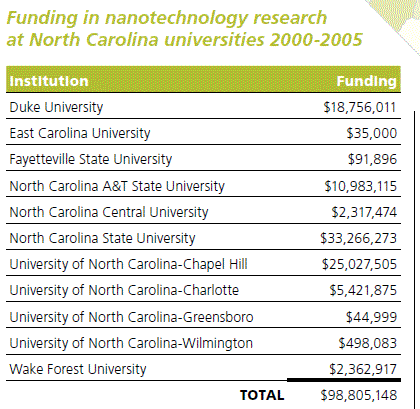 ”The
addition of a doctoral program is not an easy or simple
extension of the master’s program. Unlike most master’s
programs, a doctoral program is research-based. While
doctoral program requirements routinely include additional
course work, the central program requirement is the
dissertation. The topic for the dissertation normally
derives from discussion with faculty who are engaged in
research and therefore knowledgeable about the “frontier of
knowledge” in the discipline. For a faculty member to
then properly guide and assist the student’s dissertation
research, that faculty member must be an active researcher. Hence,
the implementation of a doctoral program must be preceded by
the assembling of faculty who are conducting publishable
research in that discipline. UNIVERSITY
OF NORTH CAROLINA PROGRAM DUPLICATION STUDY Submitted by
James H. Woodward November 1, 2011 p12] ”The
addition of a doctoral program is not an easy or simple
extension of the master’s program. Unlike most master’s
programs, a doctoral program is research-based. While
doctoral program requirements routinely include additional
course work, the central program requirement is the
dissertation. The topic for the dissertation normally
derives from discussion with faculty who are engaged in
research and therefore knowledgeable about the “frontier of
knowledge” in the discipline. For a faculty member to
then properly guide and assist the student’s dissertation
research, that faculty member must be an active researcher. Hence,
the implementation of a doctoral program must be preceded by
the assembling of faculty who are conducting publishable
research in that discipline. UNIVERSITY
OF NORTH CAROLINA PROGRAM DUPLICATION STUDY Submitted by
James H. Woodward November 1, 2011 p12] |
|
|
NCA&T was 4th in Funding in Nanotechnology Research
at North Carolina Universities with $11 Million Dollars between
2000-2005. UNC at Greensboro 10th among the 11 institutions
conducted $45,000 dollars of Nanotechnology research between 2000
thru 2005. |
Nanotechnology is Experimental
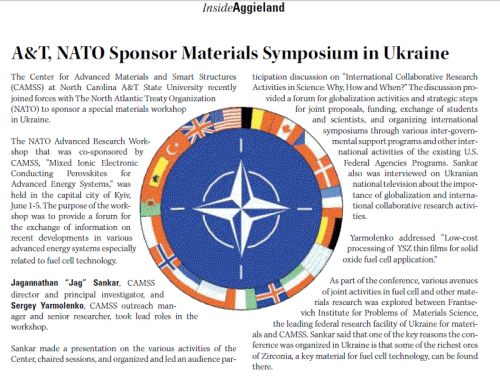 NCA&T
State University has been funded at an average rate of $3-5
million per year in the area of nanoscience and
nanotechnology. Most of the research in nanoengineering is
done in the Center for Advanced Materials and Smart
Structures (CAMSS). Several Centers and projects are under
CAMSS, including the NSF Center for Research Excellence in
Science and Technology (CREST), the DoD Center for
Nanoscience, Nanomaterials and Multifunctional Materials
(CNN) for Homeland Security, the NSF Nanoscale Science and
Engineering Center (NSEC), the NSF project on US/Europe
Materials Collaboration: Self-Organized Nanostructured Thin
Films for Catalysis, the NSF project on Nanoscale
Interdisciplinary Research Teams (NIRT), the NSF Major
Research Instrumentation for Nanoengineering Research, and
the NSF Nanotechnology Undergraduate Education (NUE)
program. CAMSS also facilitates many of the materials
research activities of the NASA-National Institute for
Aerospace (NIA). In addition, the Center for Composite
Materials Research (CCMR) does research in nano-enhanced
composite materials and the Army Center of Excellence for
Battlefield Capability Enhancements (Flexible Displays) does
research in material characterization and development of
novel displays. NCA&T
State University has been funded at an average rate of $3-5
million per year in the area of nanoscience and
nanotechnology. Most of the research in nanoengineering is
done in the Center for Advanced Materials and Smart
Structures (CAMSS). Several Centers and projects are under
CAMSS, including the NSF Center for Research Excellence in
Science and Technology (CREST), the DoD Center for
Nanoscience, Nanomaterials and Multifunctional Materials
(CNN) for Homeland Security, the NSF Nanoscale Science and
Engineering Center (NSEC), the NSF project on US/Europe
Materials Collaboration: Self-Organized Nanostructured Thin
Films for Catalysis, the NSF project on Nanoscale
Interdisciplinary Research Teams (NIRT), the NSF Major
Research Instrumentation for Nanoengineering Research, and
the NSF Nanotechnology Undergraduate Education (NUE)
program. CAMSS also facilitates many of the materials
research activities of the NASA-National Institute for
Aerospace (NIA). In addition, the Center for Composite
Materials Research (CCMR) does research in nano-enhanced
composite materials and the Army Center of Excellence for
Battlefield Capability Enhancements (Flexible Displays) does
research in material characterization and development of
novel displays. |
|
Erskine Bowles UNC
General Administration categorizing Nanoscience
Ph.D. as a Physical Science; examining UNC
Greensboro curricula for similar Physical Science
Ph.D. programs
determined: |
 |
UNC
Greensboro offer no
similar Ph.D. programs.
|
| |
|
Clearly
UNC Board of Governors and UNC
General Administration exploited
HBCU NC A&T Engineering circular and
research to establish Nanoscience MS
and Ph.D. at cross-town white UNC
Greensboro. |
|
|
|
|
|
|
Requests to UNC-GA for a UNCG Request to Plan a PhD and
Request to Establish a standalone PhD in Nanoscience
proscribed by UNC Guidelines for Academic Program
Development subsection (B) related to degree
authorization Ms. Joni Worthington (UNC-GA) Vice
President for Communications UNC General Administration
responded to a public record request for a UNCG
Chancellor signed request to plan and establish a PhD in
Nanoscience said: “Dr. Alan Mabe in his capacity
as Senior Vice President for Academic Affairs
determined:
· UNCG
was not required to submit a new request to plan a Ph.D.
in Nanoscience. The joint proposal submitted by UNCG and
NCA&T was deemed sufficient for the campus to move
forward with planning a stand-alone degree program.
· UNCG
was not required to submit a new request to establish a
Ph.D. in Nanoscience. The joint request submitted by
UNCG and NCA&T, which had already been recommended for
approval by the UNC Graduate Council, was deemed
sufficient for Board consideration. The Board of Governors
concurred with that determination in approving the
establishment of the program. (E-mail 10.08. 2010) “ |
| |
|
The President [shall] promulgate regulations
to implement Board of Governors Policy.
|
|
 |
|
Policy on
Academic Program Planning The UNC Policy Manual
400.1 Adopted |
|
 |
|
Contradicting
assertions Dr. Mabe in the capacity of Senior VP for
Academic Affairs etc., are Board approved Guidelines
for Academic Program Development subsection (B.)
Academic Program Development Requiring Authorization or
Action Beyond the Campus Level, which says The
chancellors of the constituent institutions shall
communicate to General Administration of the University
their intentions or requests with respect to
instructional program development for Request for
authorization to plan a new degree program at the
doctoral or first professional level and Request for
authorization to establish a new degree program.
[Guidelines for Academic Program Development [The UNC
Policy Manual 400.1.1.1[G] Adopted 05/06/09 |
|
| |
 Ask
(then )UNC President Erskine Bowles, Dr. Alan Mabe, Dr.
Alton Thompson, Dr. David H. Perrin, Dr. James Ryan and
NC A&T Chancellor Harold Martin, where are NC A&T
Nanoscience degrees? Ask
(then )UNC President Erskine Bowles, Dr. Alan Mabe, Dr.
Alton Thompson, Dr. David H. Perrin, Dr. James Ryan and
NC A&T Chancellor Harold Martin, where are NC A&T
Nanoscience degrees? |
Doctor of Philosophy in Nanoscience
The PhD in Nanoscience requires a minimum of 60 hours
and is designed to prepare students to take positions in
industrial, governmental, or academic research settings
by providing a solid background in Nanoscience theory
and experimental techniques through course work and
dissertation research. |
|
|
|
|
See UNC Board of Governors UNC Greensboro white
privilege Nanoscience Degrees
|

